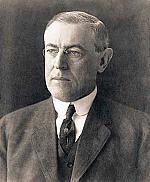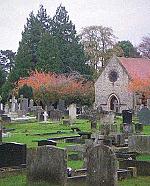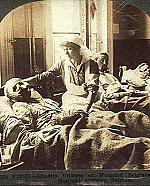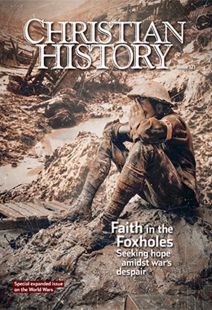A sacred conflict or an unfortunate necessity?
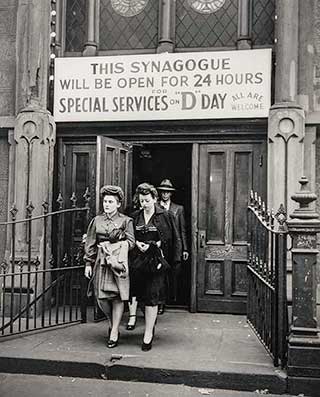
[Synagogue in wartime—Library of Congress]
IN 1940, the year before the Japanese bombing of Pearl Harbor, America was already inching, if not striding, toward involvement in the war that was raging in Europe. That January Fortune, a major secular magazine, published a scathing editorial against America’s clergy for their failure to support the war.
Fortune editors pointed out that before World War I, preachers had opposed the evil of war; but during that war they had exhibited a holy war mentality in their anti-German propaganda. Then, after World War I, the editors claimed, clergy recoiled into pacifism, ashamed of their behavior during the war. The end result? When war erupted again in Europe in 1939, American clergy were back where they started in 1914—opposed to war even in the face of, this time, real evil.
“The values used by the Church in reaching its decisions,” the editors charged, “could not have been absolute spiritual values because by no spiritual logic is it possible to get from one of these positions to the other.” But the Fortune editors may have had it backward. Church leaders had learned from their mistakes in World War I in buying into American nationalism lock, stock, and barrel. Faced with another war, they were, in scholar Gerald Sittser’s words, “trying to make a definite statement by refusing to endorse in absolute and unequivocal terms either holy war or absolute pacifism.”
Which was the holy war?
Here is the irony: when fighting a broadly Christian nation in World War I, with issues far from clear, American Christians portrayed the Germans as evil Huns, almost beyond the pale of humanity. But, in World War II, fighting against perhaps the most evil menace in human history, American Christians were cautious in their patriotism. Why?
In November 1915 at New York’s Manhattan Club, President Woodrow Wilson gave “An Address on Preparedness,” as the New York Times called it. Wilson, arguably America’s most publicly devout Christian president before Jimmy Carter, had previously called on the United States as a nation, as well as private companies and citizens, to exercise “strict neutrality” with regard to the war in Europe. But now he asked for “armed neutrality” and military preparedness.
Politician William Jennings Bryan reacted immediately and predictably. Bryan had resigned as secretary of state the previous spring when the president sent notes to Germany protesting the sinking of the Lusitania, but no similar notes to Britain for transporting munitions on a passenger ship. Though both men were committed Presbyterians, Bryan was the more theologically conservative of the two and the more decidedly pacifist.
Speaking to reporters the day after Wilson’s speech, Bryan called the president’s new stance not only a departure from American traditions and a reversal of policy, but also “a challenge to the spirit of Christianity, which teaches us to influence others by example rather than exciting fear.” For good measure Bryan referred to the elite Manhattan Club as the place where the “mammon-worshipping portion of the Democratic Party meets to exchange compliments.”
What ensued could be called “The Great Ezekiel War of 1915.” In response to Bryan, Wilson’s administration released a private letter in which the president said he had been thinking a lot lately about Ezekiel 33:2–6. That passage instructs the people of Israel to “take a man . . . and set him for their watchman.” The prophet then says that if the people fail to listen to their watchman, and war comes, their blood is on their own heads. But if the watchman fails to issue the warning, the blood of the people is on him.
Wilson’s meaning was clear: the people of the United States had elected him, he was their watchman, and he was warning America to be prepared.
“Ezekiel at the helm”
This passage was haunting Wilson’s mind because the previous August former president Theodore Roosevelt had used it in an article titled, “Peace Insurance by Preparedness against War.” TR stood as far to the militaristic side of Wilson as Bryan did to the side of so-called pacifism.
Order Christian History #121: Faith in the Foxholes in print.
Subscribe now to get future print issues in your mailbox (donation requested but not required).
In an editorial titled “Ezekiel at the Helm,” the New York Times commended Wilson for following Roosevelt’s lead in preparing for war. “If the president has taken the Colonel for his Bartlett, his concordance,” the editors wrote, “it is at least an improvement over relying on Bryan for that purpose.” (Bartlett’s Concordance was a common reference book of the day.) The editors called Bryan the watchman who would end up with the blood of the people on his hands, concluding, “Ezekiel is a much better guide for these times than Mr. Bryan.”
But the battle over war was just getting started. On November 10, 1915, Bryan responded with his own exegesis of Ezekiel: the watchman should issue the warning only when an attack was imminent—and the US was not threatened.
“It is not surprising that Mr. Roosevelt should consult the Old Testament rather than the New,” Bryan said, “because he would class Christ with the mollycoddles. But, why should the president, a Presbyterian Elder, pass over the new Gospel in which love is the chief cornerstone, and build his defense on a passage in the Old Testament, written at a time when the children of Israel were surrounded by enemies?”
As the Great Ezekiel War continued, others jumped into the fray. Former speaker of the house “Uncle” Joe Cannon (as he was affectionately called) urged Wilson to turn, not to Ezekiel, but to ancient Roman statesman Tacitus. But the Republican Cannon had a biblical reference of his own. Just as the Prodigal Son dissipated his inheritance on riotous living, he argued, so the Democrats had squandered the surplus left them by the Republicans and now lacked funds to properly defend the nation.
By the end of 1915, the Great Ezekiel War was all but over. It turned out to be a comic prelude to more serious theological attitudes. Wilson would go on to call World War I a “righteous war,” fought for the “salvation of nations,” in which soldiers shed “sacred blood.” It was, in short, “the final war for human liberty.”
Once the United States entered the conflict, the declaration of war was followed by a raging torrent of anti-German sentiment. America’s most famous evangelist at the time, Billy Sunday, liked to quip that if you turned hell upside down, you’d find “Made in Germany” stamped on the bottom. Sunday was hardly alone. Other preachers called the Germans “mad dogs, insane men, hyenas, and rattlesnakes.”
How far to plunge the bayonet?
It wasn’t just avowed fundamentalists like Sunday who spoke this way. Liberal preacher and scholar Henry Van Dyke, a former Princeton classmate of Wilson’s, said that any American who “endeavors to impede America’s efficiency in this righteous war should be judged by the law, and, if convicted, promptly executed.”
Congregationalist Lymon Abbott urged churches to become recruiting stations for the military. “In this hour every Christian Church should be a recruiting office,” he said. “The Christian ministry should hear the voice of the Master saying, ‘I have come not to send peace but a sword.’” Abbott titled one of his many wartime articles, “To Love Is to Hate,” arguing it was the Christian’s duty to hate Germany.
One clergyman said he would have happily gone “over the top” (out of the trenches and into the no-man’s land in between) and stabbed a Hun in the eye or throat, “and my conscience would not have bothered me in the least.” A northern Baptist preacher reportedly instructed listeners just how far a bayonet should be plunged to avoid wasting time that could be used to kill another German: “Three inches are not enough, seven are too many,”
In fairness to Wilson, nothing he said was quite as violent as that. But still he portrayed the German
leaders as singularly evil—forgetting how his own denomination’s Westminster Confession states the depravity and sinfulness of all human beings.
American attitudes were hardly unique. Preachers and laypeople in all the combatant nations engaged in such rhetoric about what they called a “great and holy war.” Some Christians attempted more moderate views; Pope Benedict XV lamented the “suicide of civilized Europe” and offered peace proposals as late as 1917. Still the high price of resistance was instructive. Quakers in Boston, for example, were arrested for distributing copies of the Sermon on the Mount.
By contrast the Christian response to World War II was cautious—sometimes too cautious, if one were to ask President Franklin Delano Roosevelt. Once America entered World War II, FDR portrayed the fascist aggressors as “implacable foes of every principle by which Christian nations live. . . .strangers alike to the love of God and of man, [knowing] no Christian impulse—neither mercy, justice, nor compassion.”
Putting on spiritual armor
This time such charges were accurate. The irony, of course, is that when similar things were said about the kaiser in 1918, they were not true. The Germany of World War I was not bent on domination of all of Europe, let alone the extermination of the Jews.
Throughout the war FDR continued to speak passionately about the need for “spiritual armor” and a “revival of religion” that would strengthen the nation in the fight. In contrast to Wilson’s vision of war as a righteous and sacred activity, the nominally Episcopalian FDR professed the traditional Christian posture of “just war”: that war is an unfortunate necessity to stop naked aggression in a fallen world.
What can we make of all this? On the one hand, we could argue that American Christians in both wars merely mirrored the larger culture. Long ago, in Christianity, Diplomacy and War (1953), Christian historian Herbert Butterfield argued that these secular wars of the twentieth century were like the holy wars of the Middle Ages. Each side sought to convince its people “that our enemy is worse than the rest of human nature and that his wickedness demands utter destruction,” Butterfield wrote. And Christians joined right in and led the way: only a small minority stood up and said, “Wait a minute.”
But it is also true that many American Christians did something rare after World War I. They learned from history. In the 1920s and 1930s, the majority of Americans became strongly isolationist and some actually pressured Congress to pass Neutrality Acts so that the United States could not get involved in another European war.
Nationally famous liberal preacher Harry Emerson Fosdick was as gung-ho for war as anyone the first time around. But a chastened Fosdick sounded very different in 1941. In his appropriately titled book, Living under Tension, he wrote, “This present world, war-torn and terrible, denies everything that Christ taught and stood for.” Most American Christians may not have been that reflective and eloquent. But they were cautious patriots the second time around, recognizing the tension between this fallen world and the kingdom of God. CH
This article is from Christian History magazine #121 Faith in the Foxholes. Read it in context here!
By Barry Hankins
[Christian History originally published this article in Christian History Issue #121 in 2017]
Barry Hankins is professor of history at Baylor University and author of Woodrow Wilson: Ruling Elder, Spiritual President.Next articles
“The world must be made safe for democracy”
Wilson counseled war after campaigning to keep America out of it
Woodrow WilsonNo atheists in the foxholes?
Some people found religion in the experience of wartime, but others lost it
Kevin L. WaltersSupport us
Christian History Institute (CHI) is a non-profit Pennsylvania corporation founded in 1982. Your donations support the continuation of this ministry
Donate




